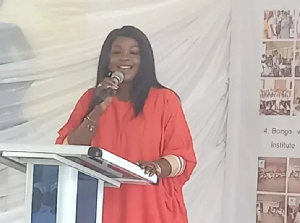The Ghana National Coordinator for the Global Movement of Pan-African Women Leaders (PAWL), Lamisi Adene Kumordzie, has underscored the need for African countries to prioritize and champion the rights of children to empower them for a greater future and propel accelerated development.
According to her, the future hinges on the ability of children to harness the potential of contemporary technology and knowledge to address societal problems, and she stressed that creating an enabling environment for children to thrive and realize their potential was the way to go.
“We often leave the children because we think that they do not know much, but if we put two or three children together, the kind of ideas they will bring on board will marvel us, so we must give them the right to speak and voice out,” she said.
Mrs. Kumordzie was addressing stakeholders and students during the commemoration of this year’s International Day of the African Child Conference, organized by the Global Movement of Pan-African Women Leaders, held in Bolgatanga in the Upper East Region.
It was held under the theme, “Educate an African child, fit for the 21st century.”
Apart from ensuring that every African child is educated, Mrs. Kumordzie indicated that children have huge talents and there is a need for stakeholders to prioritize the health and well-being of children, emphasizing access to nutrition, fundamental rights, and the right environment for children to realize their unearthed potentials.
“Let us celebrate the power and the community of unity, and together we can create an environment where every child can dream, inspire, and achieve their full potential.”
The Chief Director of the Upper East Regional Coordinating Council, Alhaji Inusah Abubakar, who was the guest of honor, bemoaned that after several years of being the first country in Africa to ratify the United Nations Convention on the Rights of the Child, many children in Ghana were still faced with lots of challenges.
He said poverty, conflict, diseases, illegal mining, and child labor, among others, continued to deny children the opportunity to be educated and exercise their rights, and stressed that there was a need for policy direction and renewed commitment from relevant institutions and stakeholders to address the challenges to build a better future.
“On this day of the African child, we need to advocate for policies and initiatives that support and promote children’s welfare and development. This calls for concerted efforts, which must be guided by a shared vision where every child can inspire and achieve their fullest potential."
“Government and civil society organizations will have to continuously work in a coordinated and sustained manner to gain international cooperation and solidarity,” he added.
The Headmistress of Bolgatanga Girls Senior High School (BOGISS), Patricia Anaba, noted that children are the future of all nations and reiterated a collective sense of responsibility to nurture, protect, and empower them to thrive and succeed in the contemporary world.
“It is our duty to break down the barriers that stand in the way of children, whether they are economic, social, or cultural, and to foster a community that uplifts and supports every African child,” she added.
Naba Baba Salifu Atamale Lemyaarum, the Paramount Chief of the Bongo Traditional Area, said it was imperative for stakeholders in education to recognize the potential of children and work to support them to achieve the needed development.
Regional News of Thursday, 11 July 2024
Source: angelonline.com.gh

















